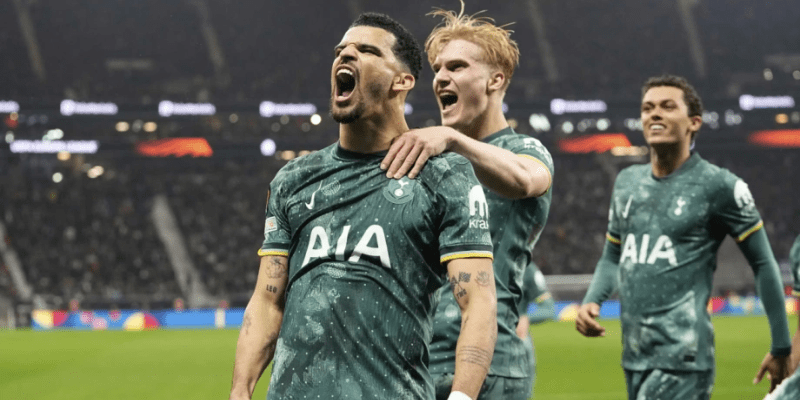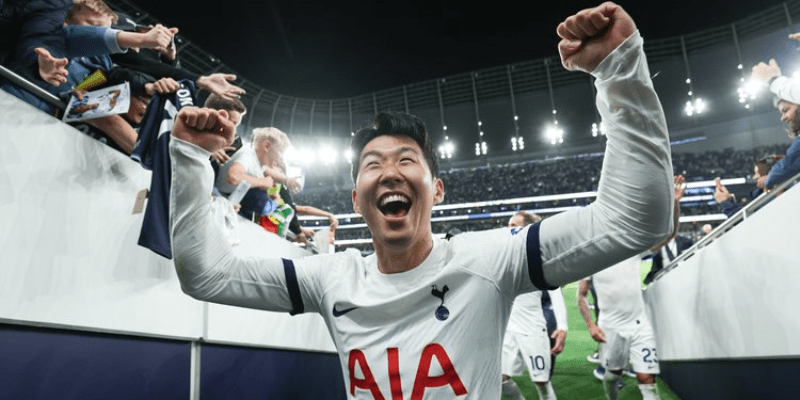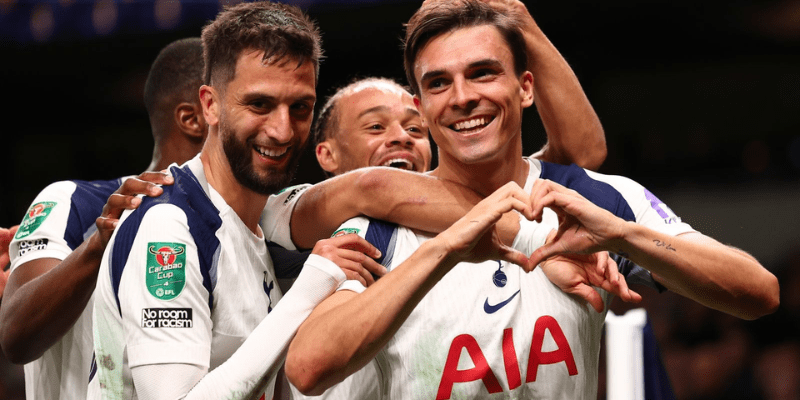The roar at Tottenham Hotspur Stadium on May 14, 2024 wasn’t just for another match—it marked a new chapter in Spurs’ history. When Mikey Moore stepped on as a late substitute, he became the youngest player to play for Tottenham in the Premier League era, breaking a club record that had stood for years. In this article, TigerKick will take you through Moore’s sensational journey, show how his milestone compares with legends, and explore what lies ahead for Tottenham’s latest prodigy.
The record-breaking debut

On that day against Manchester City, the 16-year-old Moore was introduced in the dying moments, replacing James Maddison in stoppage time. His age at debut—16 years and 277 days—smashed the previous benchmark set by Dane Scarlett, who had debuted at 16 years and 310 days (or roughly 16y 10m 14d) in 2021. Moore’s appearance thus etched his name into Spurs folklore.
The club officially celebrated this moment, calling it “our youngest ever player in Premier League history.” That distinction specifically refers to Tottenham’s top-flight squad, not other competitions. But it was a statement: Antony and youth are alive at Spurs.
Yet, one nuance: while Moore holds the youngest Premier League debut title, Spurs in domestic cup competitions have seen even younger appearances. For example, in September 2025, Luca Williams-Barnett made history by becoming Tottenham’s youngest ever player in the League Cup, debuting at 16 years, 11 months, and 24 days. Though this doesn’t supersede Moore’s league record, it’s a reminder that Spurs’ youth system continues to unearth talents at stunning ages.
Before Moore: Scarlett, Devine & the legacy of precocity

To fully grasp how extraordinary Moore’s feat is, we need context.
Dane Scarlett’s original record
Before Moore’s arrival, Dane Scarlett defined the young-gun era at Spurs. When Scarlett made his senior debut, he was 16 years and 247 days old—but that was in the UEFA Europa League (not the Premier League). His Premier League debut came shortly after, and his status as one of Spurs’ youngest first-team players was secured.
Scarlett’s breakthrough gave fans hope that the club was committed to trusting youth at the highest level—something Moore later capitalized on.
Alfie Devine: the youngest in Spurs history (for a moment)
In early January 2021, another academy standout, Alfie Devine, momentarily upstaged Scarlett. Devine made his Tottenham debut at 16 years and 163 days in an FA Cup tie. His cameo also included a goal—making him the youngest scorer on debut for Spurs. But his involvement was limited, and MLS moves and injuries later complicated his path.
Although Devine’s appearance is arguably the strict “youngest ever Tottenham player” in any competition, mainstream narratives often distinguish by competition type (league vs. cup). Moore’s record is in the Premier League, which carries high prestige and attention.
So depending on how one defines “play for Tottenham” (all competitions or just the league), the answer might shift. But when most fans ask “youngest player to play for Tottenham” they imply top-flight appearances—and in that sense, Moore is king.
Who is Mikey Moore? From academy to first-team
Moore’s story began long before that May night. He joined the Tottenham academy as an under-9 and rose steadily through every level. He exploded in youth competitions, often leading in goals or assists in Under-16, U17, and U18 channels.
At just 15, he even featured for the Spurs U21s, making him one of the youngest players ever to play at that level. His academy performances earned high praise and caught wider attention.
After his record-breaking debut, Moore’s momentum accelerated. He signed a professional contract at 17, started earning first-team minutes, and even made his European debut in the UEFA Europa League. In January 2025, he scored his first senior goal—with the last kick of the match against IF Elfsborg—becoming Tottenham’s youngest ever scorer in a European competition at 17 years, 172 days.
In the 2025–26 season, he went on loan to Rangers to gain regular senior experience. That move aims to test his resilience, adaptability, and readiness for top-level football beyond the comfort of the academy. However, some reports suggest he’s struggled for consistent playing time in Scotland—raising questions about how Spurs will monitor and manage his development back home.
How does Moore’s record stack up across football?

Young talents making senior debuts is not a rarity—but breaking age records at big clubs is exceptional.
- In the Premier League at large, Ethan Nwaneri and Harvey Elliott set early records.
- In Europe, Ansu Fati debuted very young for FC Barcelona; Martin Ødegaard appeared early for Strømsgodset and Real Madrid.
- At Tottenham, though, Moore’s record in the league is more remarkable because Spurs haven’t historically thrown very young players into the Premier League until recent years.
Comparisons also underscore the shifting landscape: elite clubs are now more willing to trust 16- and 17-year-olds in big matches. The key difference is the club’s faith, the player’s maturity, and the environment in which they are nurtured.
Risks and rewards: What lies ahead for Moore
Launching a professional career so young brings opportunities—and hazards.
Opportunities:
- Legacy building: Moore already has one all-time Spurs record. Should he fulfill potential, he could shatter more.
- Brand & market value: Clubs always value young stars; he’s likely to attract interest and endorsements.
- National allegiance: Moore is eligible for both England and Wales. Youth appearances for England’s U19s exist, but a senior choice is yet to come.
Risks:
- Burnout & injuries: Younger bodies are more vulnerable to physical strain.
- Mental pressure: Carrying hopes of fans, media, and personal expectations can weigh heavily.
- Loan stagnation: If the Rangers move doesn’t yield regular starts, Moore might lose momentum.
Spurs must manage his minutes, ensure stable coaching environments, and return him with clear roles—not to stunt him through inconsistent integration.
The future of Spurs youth—Moore as a symbol
By becoming the youngest player to play for Tottenham in the Premier League, Moore’s debut is part of a broader identity shift. Tottenham is signaling that academy pathways matter—talent will be recognized early, and youth voices will be heard in the first team.
If Moore thrives, he could epitomize a new era: homegrown, fearless, and forward-facing. But his is not just a personal quest—it’s emblematic of Tottenham’s ambition to return to big-stage relevance while honoring its tradition.
Conclusion
In this article, TigerKick has unveiled why Mikey Moore holds the title of youngest player to play for Tottenham in the top flight—and the nuanced context behind it. From Scarlett and Devine’s records to Moore’s own trajectory, we see the evolving narrative of Spurs’ youth.
As Moore navigates loans, pressure, and expectations, fans and pundits will watch closely. Do you think he’ll surpass other club legends? Stay tuned for future updates, deep dives, and match analysis—right here.






